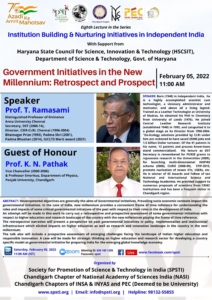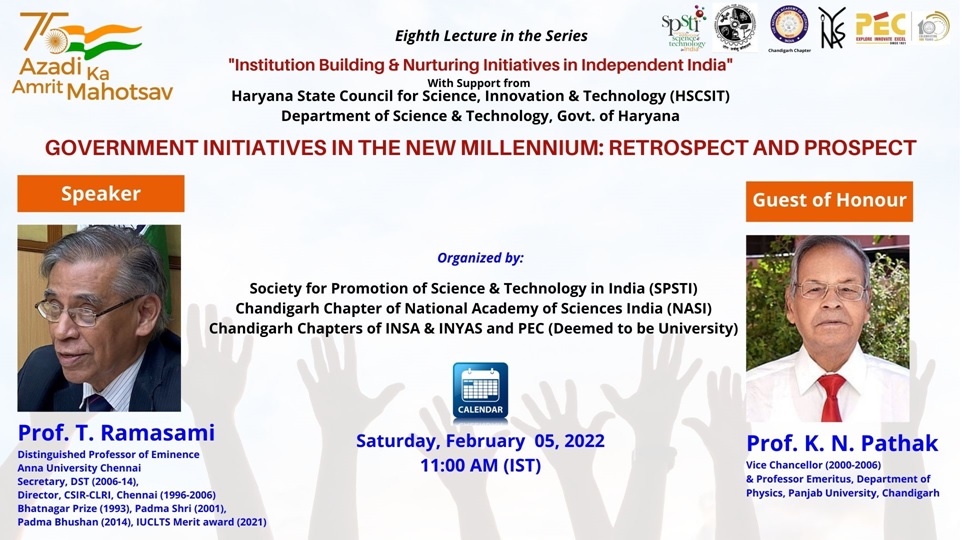The Society for Promotion of Science & Technology in India (SPSTI), in association with Chandigarh Chapter of the National Academy of Sciences India (NASI) and Chandigarh chapters of INSA & INYAS and Punjab Engineering College (PEC) (Deemed to be University), Chandigarh and with support from Haryana State Council for Science, Innovation & Technology (HSCSIT), DST, Govt. of Haryana, organised the eighth lecture of the Eighteen part Lecture series devoted to ‘Institution Building & Nurturing Initiative in Independent India’ to celebrate Azadi ka Amrut Mahotsava. The lecture entitled “Government Initiatives in the New Millenium: Retrospect and Prospect” was delivered by Padma Bhushan Prof. T. Ramasami, former Secretary, DST, Govt. of India on February 05, 2022 at 11.00 am through online mode. The session was attended on zoom platform by 65 and many more viewed the same on the Facebook page of SPSTI.
Prof. K. N. Pathak, former Vice Chancellor, Panjab University Chandigarh & Professor Emeritus, Department of Physics, PU was the Guest of Honour who congratulated the organizers for the choice of subject of the series, pointing out that Private Institutions also have made significant contribution to Scientific – Tachnical development of the country, as is the case with Bharat Biotech and Serum Institute.
Prof. T. Ramasami, distinguished Professor of Eminence, Anna University, Chennai, former Secretary, DST, Govt. of India, former Director CSIR-CLRI, Chennai, Bhatnagar Prize (1993) and IUCLTS Merit (2021) awardee, was described as Technologist turned Scientist turned Administrator.
Prof. Ramasamibegan his lecture with the national education policies India has had after independence and how the major principles of these policies progressed with the need of the nation. The focus shifted from national integration through education (1986)to removing disparities and provide equitable opportunities (1986) to maintenance of professional standards (1992) to the optimization of learning of students based on their cognitive development (2020). NEP 2020 further set the goal for higher education institutions to become multidisciplinary by 2040, along with setting up high performing universities to set up their campuses in other countries and top universities of the world to operate in India.
He further talked about the science, technology and innovation policy STIP initiates by the Government of India. STIP 2020 links science, technology and innovation with socioeconomic welfare and the formulation of this policy has been through bottom up approach and it encourages establishment of national research foundation for supporting non-linear processes of science, research and innovation.
These policies have impacted the research supporting the start-up culture and linking science to the societal development and making India as an emerging power in the world. He shared how the institutional infrastructure has changed in India.Where pre-independence India had only few institutes and few states universities, the number has today risen to 52000 colleges and higher education entities, 1023 universities, 9departments in GoI dealing with Science and Technology, 680 national R&D institutes and 3,40,000 full time R&D professionals. This change has been brought about by the urgencies of demography and increasing aspiration of the students. Various schemes and implementation strategies of the government include expansion of IITs, IIMs, IIITs, colleges and universities, establishment of IISERs, Right to Education, Innovation in science pursuit for Inspired Research (INSPIRE), Promotion of University Research and Scientific Excellence (PURSE), schemes for gender parity in higher education and national knowledge network for connectivity. He also talked about RUSA, e-learning course material available for all grades in 31 languages, digitisation of learning with DIKSHA, SWAYAM, PRAGYATA, OLABs and NROER, NISHTHA for capacity building for elementary school teachers and school heads.
Various government initiatives are in place for de-bureaucratization and rejuvenation of universities and R7D establishments. These initiatives have shown the impact by rise in essential science indicators data base, patenting activities and change in start-up ecosystem making India the 3rd largest start-up ecosystem in the world. Talking about improving competitiveness of India in scholarly publication activity he shared data where India id 3rd in Scopus data base and 7th in Web of Science. India is in the 6th place among countries expending in R&D and the only country from lower middle-income group. The other top five countries are either from high income or upper middle-income group. He said India needs a country specific mode with higher return investment. He concluded by saying India needs a country specific model for building a knowledge society that serves the underserved and unserved world through science by balancing excellence and equity. Rabindra Nath Tagore said “all modern civilizations have their cradles of brick and mortar……in India it was in the forests that our Civilization has its birth, character from this origin and environment”.
The session was steered and conducted by Prof. Arun Kumar Grover, Former Vice Chancellor of Panjab University and Vice President of SPSTI, Prof. Keya Dharamvir, General Secretary, SPSTI, Ms. Rajni Bhalla. Joint secy. SPSTI and Dr. Rohit K. Sharma, member INYAS and Shri Dharam Vir, IAS (Retd.), President, SPSTI. Prof. K. K. Bhasin, NASI, Senior Scientist and Professor Emeritus, Panjab University presented the concluding remarks and vote of thanks. The session was much appreciated by the audience and followed with lively questions and discussion. The information about future lectures in the series will be available on the SPSTI webpage and lectures can be accessed on the SPSTI Facebook page.


